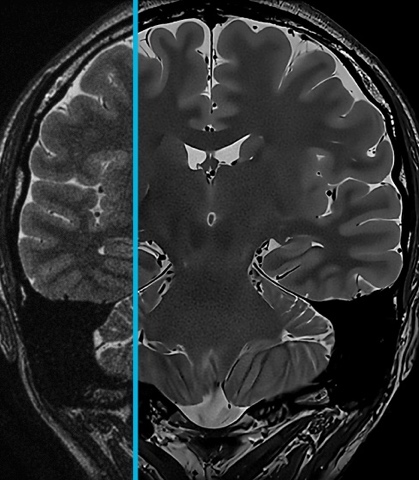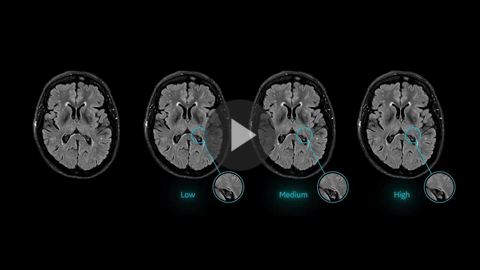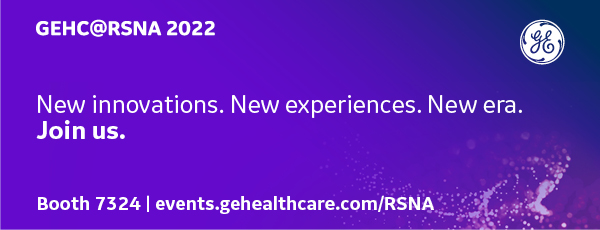Magnetic resonance imaging (MRI) is often cited as one of the most important medical developments of the 20th century, and its impact and capabilities continue to grow.[1] Forward-thinking MRI innovations enable broad access to advanced imaging technologies and image reconstruction software; this can often be achieved even when employing a health system’s existing installed equipment, expanding the breadth and competencies of its systems.
A powerful diagnostic tool, MRI offers clinicians an information-rich opportunity to image and evaluate disease,[2] and many patients around the world have benefited from the technical advances in MRI hardware and software.[3] Clinicians and patients rely on MRI exams for non-invasive diagnostic evaluation in many clinical areas, including neurology, cardiology, pulmonology, and much more.
It is becoming increasingly apparent and more important for imaging equipment to stay updated. The growing occurrence of various chronic health conditions as well as an aging global population are fueling the demand for accurate and efficient imaging technologies, such as MRI.[4] And the introduction of novel artificial intelligence (AI) and deep-learning technologies in MRI has spurred even more growth.
MRI software solutions that improve the bottom line
In an IMV report on Global Imaging Department Priorities and Outlook, radiologists reported two of their top three departmental priorities as (1) improving department workflow efficiency and productivity and (2) keeping their department current with state-of-the-art technology.[5]
State-of-the-art AI innovation in MRI is a need for health systems because it can deliver gains in clinical accuracy, image quality, and patient benefits. However, purchasing MRI equipment on a regular basis is not always possible. Fortunately, a key aspect of AI innovation in MRI is extending the utility of existing equipment.
Industry partners such as GE Healthcare understand that extending the lifespan of expensive equipment is important, as is driving sustainability. They are continually working on solutions that raise the bar with cutting-edge software to improve image quality while streamlining the clinical workflow and driving better patient outcomes. Approaching department challenges holistically is important to drive improvements for staff, patients, and the entire health system.
“Medical technology providers must continue to develop innovative solutions that can help to improve our customers’ clinical capabilities without the need for frequent capital equipment spending,” says Jie Xue, President and CEO Global MRI, GE Healthcare. “We’re making it possible for our customers to access new and innovative technologies in MRI with just a software upgrade.”
“Our purpose is not only to extend the life of their existing equipment but also to level-up clinicians’ diagnostic confidence and clinical accuracy with AI and deep-learning technologies that are significantly improving image quality.”
Advances in imaging technology have enabled radiologists to deliver personalized care along with earlier diagnoses and treatments of diseases. Today’s radiology departments are feeling a tremendous need to improve efficiencies while keeping costs low, due to increasing system complexity, strained budgets, and staff shortages.
New AI and deep-learning techniques such as the deep-learning algorithm are unique in that they don’t necessarily require a significant hardware upgrade; they can be used on most existing systems via an MR software upgrade. Clinicians can then provide patients with high-quality diagnostic care with just an upgrade to their MRI software capabilities, extending the life of equipment over a defined period.
“The benefits of selecting a software upgrade to improve MRI capabilities are not only achieved through the absence of capital expenditures,” Xue explained. “The upgrade path also increases the possible efficiency gains to be achieved by examining patients faster, enabling improved image collection and quality, increasing patient comfort, and supporting decision making—all of which allow improved patient throughput.”
MRI deep learning advances that allow for sharper image quality and shorter scan times
GE Healthcare’s latest MR reconstruction technology is a deep-learning trained algorithm to reconstruct sharper images by leveraging all of the raw MRI acquisition data. It delivers a higher signal-to-noise (SNR) ratio with multiple user-selectable improvement levels and is compatible with all anatomies.
Advances like these in MRI technology, have enabled compelling results thus far, even on previous generation scanners. Powerful improvements can be seen in image quality and spatial resolution due to deep-learning image reconstruction techniques obtained via a software upgrade. Higher image quality can be a game changer in supporting the radiologists reading the images—helping them feel more confident with their diagnoses. In this way, these innovations allow for technological advances like improved image quality and faster scanning times, but they also support a better patient experience.
View clinical video - AIRTM Recon DL
Applying AI and deep-learning algorithms to MRI image reconstruction is an exciting realization of technology, enabling MR improvements that have not been previously possible using traditional reconstruction methods. For example, healthcare providers are using new technologies to produce high-quality images with shorter scan times—overcoming the historical trade-off once experienced between scan time and image quality.
Thomas Schrack, MD, of Fairfax Radiological Consultants in Fairfax, Virginia, explained his thoughts after encountering GE Healthcare’s new deep-learning MRI technology. “We would have thought these images wouldn’t be possible in any kind of standard scan time, but as it turns out, they were not only better images, but they were also [acquired] much faster.”
“The image quality was fantastic immediately,” explained Randall Stenoien, MD, Owner and CEO of Houston Medical Imaging, Houston, TX, “and we were seeing dramatic reduction in scan times. One of our first patients … was a pituitary scan [exam]. In January 2020, that was a 30:40 minutes exam, and when the patient returned for a follow-up ten months later, the scan was 14:42 minutes, a 52% reduction.
“And when I sent those images to my neuroradiologist, I immediately got a phone call to ask what in the world had happened. It was the prettiest pituitary scan she’d ever seen.”
Utilizing MRI software upgrades, clinicians can improve efficiencies with shorter scan times, condensing appointments to handle increasing demands for medical imaging.
“Most importantly, this latest suite of AI algorithms for MRI is not just available on our newer systems. We’ve made the upgrade an accessible option for most of our existing installed base,” says Xue. “We want to contribute to healthcare systems’ operational efficiencies and financial sustainability. With our deep-learning technology upgrade for MRI, we see it as the means to do just that.”
The MR 30 for SIGNA™ software release* brings the much-anticipated extension of AIR™ Recon DL to 3D and motion-insensitive PROPELLER for your SIGNA™ MRI scanner. It also integrates a host of additional applications such as DTI, FSE Flex, CartiGram, as well as phase-sensitive MDE, and T1 mapping for cardiac imaging.
Deep-learning MR reconstruction signals a sustainable future in healthcare
As MRI continues to be a trusted resource—helping providers gather more robust clinical insights and evaluations—innovative AI and deep-learning-based technologies offer unprecedented image quality and workflow efficiencies that help reduce stress on radiology staff.
With constant technological developments over the years, the quality of MRI has improved significantly. Industry leaders will likely continue to focus on developing and delivering MRI innovation through AI and deep-learning technologies that can fortify clinicians’ diagnostic accuracy with improved image quality and refined clinical and operational radiology workflow efficiencies.
Learn more about GE Healthcare’s deep-learning MRI reconstruction algorithm, AIR™ Recon DL.
DISCLAIMERS
Not all products or features are available in all geographies. Check with your local GE Healthcare representative for availability in your country.
*AIR™ Recon DL 3D and PROPELLER are 510(k) cleared in the USA. MR 30 for SIGNA™, AIR™ Recon DL 3D, and PROPELLER is not yet CE marked. Cannot be placed on the market or put into service until it has been made to comply with CE marking. Not commercially available in all markets. Some applications discussed are optional/purchasable. Please contact your local GE representative for more information
REFERENCES
[1] Fuchs VR, Sox HC Jr. Physicians’ views of the relative importance of thirty medical innovations. Health Aff (Millwood) 2001;20(5):30–42.
[2] van Beek EJR, Kuhl C, Anzai Y, et al. Value of MRI in medicine: More than just another test?. J Magn Reson Imaging. 2019;49(7):e14-e25. doi:10.1002/jmri.26211
[3] https://pubs.rsna.org/doi/full/10.1148/radiol.2019192011
[4] https://www.biospace.com/article/medical-imaging-market-top-5-trends-impelling-the-industry-share-through-2026/
[5] The IMV 2019 Global Imaging Market Outlook Report








